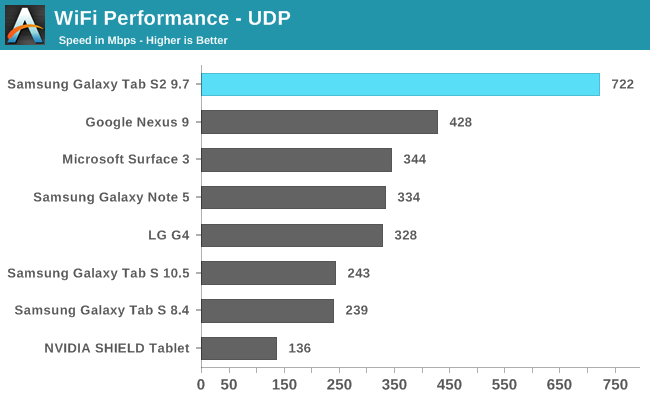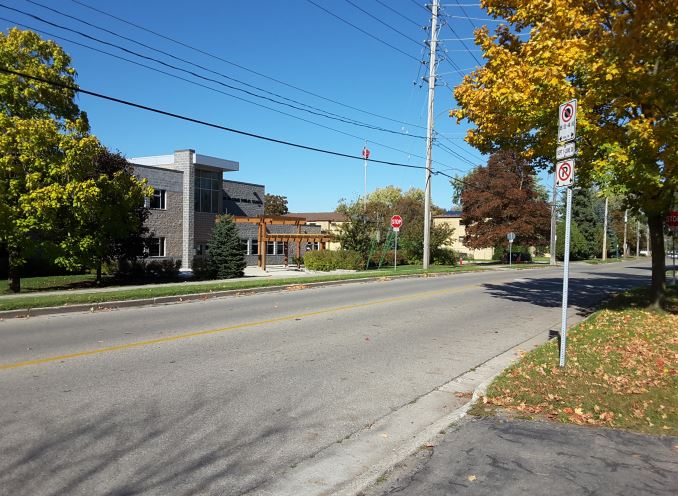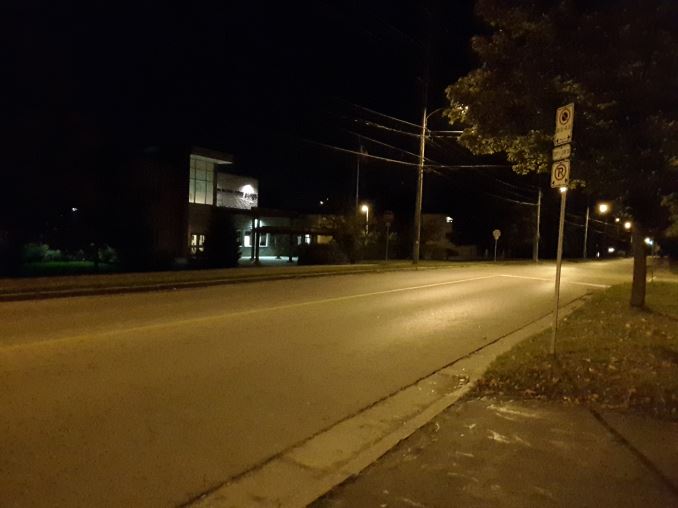The Samsung Galaxy Tab S2 Review
by Brandon Chester on October 15, 2015 8:00 AM ESTCamera: Photos and Videos
The number of users that use their tablet as their primary camera is far larger than anyone ever could have predicted when the tablet market was emerging. However, there are some obvious reasons why someone would opt for their tablet. It may actually be the best camera they own, and older users with aging eyes can definitely appreciate the fact that their tablet display turns into a giant high resolution viewfinder. The cameras themselves have also improved significantly from the dark days of the 1.2MP rear camera on the iPad 2.
Since the Tab S2 is extremely thin, Samsung has needed to allow for a camera hump in order to fit their 8MP sensor. The hump isn't very large, and although it's larger than that of the iPhone 6, it's not near as large as the camera hump on the Galaxy S6. It's honestly not really an issue, but some customers who are very serious about the design of their devices may take issue with it.
Below you can view the known specifications of the Tab S2's rear and front-facing cameras. Unfortunately I don't have data on the specific model of the rear-facing sensors used in the original Tab S series, so that info is omitted on the chart.
| Camera Specifications | ||||
| Galaxy Tab S1 Series | Galaxy Tab S2 Series | |||
| Front Camera | 2.1MP (1920x1080) |
|||
| Front Camera - Sensor | S5K6B2 (1.34 µm, 1/6") |
|||
| Front Camera - Focal Length | N/A | 27mm eff | ||
| Front Camera - Max Aperture | F/2.4 | F/2.2 | ||
| Rear Camera | 8.0MP (3264x2448) |
|||
| Rear Camera - Sensor | N/A (1.12 µm, 1/4") |
S5K4H5 (1.12 µm, 1/4") |
||
| Rear Camera - Focal Length | 32mm eff | 31mm eff | ||
| Rear Camera - Max Aperture | F/2.4 | F/1.9 | ||
While Samsung hasn't made any radical changes to the camera sensor specifications with the Tab S2, they have significantly widened the rear-facing camera's aperture. Changes to image processing and ISP improvements will also have an enormous impact on image quality.
As always, my photo testing begins with a scene during the day, followed by that same scene at night to test low light performance. While the low light test is still pretty brutal on current tablets, it's a very good indicator of the quality of an OEM's image processing.
During the day the Tab S2 performs very well. Detail is on par with the iPad Air 2, which isn't surprising given the similar sensors and Samsung's large improvements in image processing quality this year. My only complaint is that there is a bit too much sharpening going on which exacerbates the artifacting on the wall of the building caused by the limited effective resolution of the camera system. What's interesting is that the Galaxy S6 Edge processes the image with less sharpening, which is likely intentional on Samsung's part as the S6 has a much larger sensor with a higher resolution. Overall, I'm happy with the Tab S2's camera quality, and I'm glad Samsung decided to give the tablet a bit of a camera hump instead of crippling the camera quality to fit in the 5.6mm profile of the chassis.
Low light photography is where I started to have some issues taking photos with the Tab S2. For some reason it simply refused to run the autofocus, and I had to try and manually focus by tapping which is difficult on such a large device. Once I was able to focus and take the shot I took a few, and the best result is the one you see above. For a tablet it's actually a pretty good photo, although as you can see from the street lamps the photo is definitely overexposed to a degree. Compared with the iPad Air 2 there's actually not much more visible in the frame despite the overexposure, and the Air 2 has a better rendition of the grassy patch on the right side as well as the no parking sign. Both photos are still very good as far as tablets go, but I do think the iPad wins out by a little bit because of the exposure and slightly better detail preservation.
The Tab S2 can record video at 1080p30, and also at 1440p30 although the latter disables video stabilization and so I've opted to just use the 1080p recording mode. Looking back at all the tablets I've evaluated, it's clear that the Tab S2 has the best video recording quality by far. It's definitely not perfect, with some jiggle to the frames caused by the EIS and a bit too much saturation to the colors, but the overall quality, sharpness, and consistency of the frame rate is better than any other device I've tested.
WiFi Performance
Like the original Tab S, the Tab S2 ships with a 2x2 802.11ac WiFi implementation. I actually haven't been able to track down exactly which WiFi chipset they're using, which is unfortunate. The original Tab S actually had strangely slow WiFi performance given its peak theoretical bandwidth of 866Mbps, and I was hopeful that the Tab S2 would fare better.

As you can see, the WiFi performance on the Tab S2 is miles ahead of the previous models, and ends up having the highest peak bandwidth on record for a mobile device. Samsung did a great job improving on last year's WiFi implementation, and if there's going to be any bottleneck over WiFi it's not likely that t it will be the Tab S2.























162 Comments
View All Comments
darkich - Saturday, October 17, 2015 - link
Brandon, there is a MAJOR omission in your take on the multitasking here..You missed the exact area where Samsung absolutely shines and sets itself far apart from any competition, in regards of multitasking, and that is WINDOW WITHIN WINDOW function.
Using multi window bubbles, user can use, move, open, resize and minimize multiple apps within each other, and they all remain FULLY DISPLAYED with no clipping and scaling issues whatsoever!
It really a complete, intuitive multitasking in the fullest sense of the meaning, unprecedented on tablets.
Here's what I mean:
http://tinypic.com/r/5ujuc7/8
Just made this screenshot on my Note 3(not even a tablet!), after opening Gmail, Play Store and the browser where I uploaded that image.
Oh and the keyboard remains fully usable throughout, taking its usual bottom half place.
So please, reconsider and revisit the software part of the review. This is a major deal, and the level of general public ignorance about it is obviously(since even you weren't aware of this feature) unacceptable.
Brandon Chester - Monday, October 19, 2015 - link
There no omission, it's mentioned in the software section, so I'm clearly not unaware of it. I didn't go over it in detail because the UX is no better than any of the other multitasking features and I already felt bad about criticizing Samsung for UX issues that they can't fix without control of the OS.darkich - Monday, October 19, 2015 - link
Well then, care to elaborate here under the radar, what's exactly wrong with Samsung’s multi window (and not the useless split screen function that you were describing)??As you can see I'm using multi windows on my small pocketable device and it works like a charm (except for hit and miss gesture that activates it), and on a big tablet screen that feature should absolutely be one of the highlights of usability.
darkich - Saturday, October 24, 2015 - link
Just like I thought.. You're left with NO ARGUMENT.Fact - Samsung’s multitasking in multi window mode is executed in amazing way (actually you don't even need to use the gesture, just tap on an app you want to add, after tapping on the plus window next to the app tray) yet you didn't knew lanything about it, and you *did not* mentioned it in the article.
nerd1 - Saturday, October 17, 2015 - link
One thing totally ignored in this review is that (non-american) cellular version of samsung tablets have full phone capability intact. That's the main reason I keep using samsung tablets, since OG galaxy tab 7". You save a lot of money just using one device for both phone and tablet, instead of buying two of them and using two separate plans.Achilles07 - Saturday, October 17, 2015 - link
It might be construed from the review that tab S2 is a slow performer given the lackluster performance figures in comparison to competition.On the contrary, I never felt the tab lagging in any applications during my daily work schedule with it. I use the MS powerpoint, and Word that came bundled with it. Not an issue at all. Opening up ppt with animations dragged a bit.
A tab of this functionality is a good companion for me in my office work and travel in metro.
I am not a gamer, so I cant comment on the gaming performance. But the real world performance as is as good as it can get for a tablet. For reference mine is the 8.0" LTE version.
KoolAidMan1 - Saturday, October 17, 2015 - link
Slower performance, poor security, no guarantee of OS updates, poor developer support and bad apps, and someone will still try and explain why Android is somehow the better platform.darkich - Sunday, October 18, 2015 - link
All Samsung high end product are basically guaranteed to receive updates for about two years.Android now has around 65% tablet market share, with a tendency of increase so that in the long term means developers will naturally have to support it.
As for other things, Android is vastly superior in terms of customization and third party apps - myriad of fantastic browsers (while iOS basically allows just a reskinned safari apps), media players, app managers, keyboards, widgets..
Also, Android allows full system access and file management which should be an absolute must on a tablet OS.
AND, you can connect peripherals (keyboard, mouse, USB) just as easily as you can with a Windows device.
Enlightened yet?
toyotabedzrock - Sunday, October 18, 2015 - link
Sounds like Google has lost interest in Android and Samsung thinks or rather isn't thinking about the need to compete with Apple by using a more well equipped SOC for the tablet and doing very little software wise.doggface - Sunday, October 18, 2015 - link
And Samsung just announced they are not going to update the software on this tab any further. In a statement the company said "3 weeks of updates are plenty" /s